Mark Anthony Kerry is an Australian former backstroke and freestyle swimmer of the 1970s and 1980s, who won three Olympic medals, including a gold in the 4 × 100 m medley relay at the 1980 Summer Olympics as the backstroker for the Quietly Confident Quartet. During his career, he won twelve Australian Championships.

The men's 200 metre backstroke was an event on the Swimming at the 1900 Summer Olympics schedule in Paris. It was the first Olympic swimming event to not be a freestyle competition. It was held on 11 August and 12 August 1900. 16 swimmers from 7 nations competed. The event was won by Ernst Hoppenberg of Germany, with Karl Ruberl of Austria second and Johannes Drost of the Netherlands third.
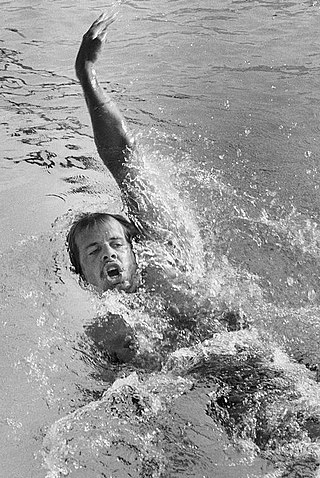
The men's 200 metre backstroke event for the 1976 Summer Olympics was held in Montreal. The event took place on 24 July. There were 33 competitors from 23 nations, with each nation having up to 3 swimmers. The event was won by John Naber of the United States in world-record time; he was the first person to swim the event in under 2 minutes (1:59.19). It was Naber's fifth medal of the Games: completing a double in the backstroke events as well as golds in the medley relay and the 4×200 free relay, along with a silver in the 200 free. It was the second American victory and second American medal sweep in the men's 200 metre backstroke, after 1968; of the 12 medals from 1968 through 1976, 10 were won by Americans and the other two by Roland Matthes. Peter Rocca (silver) and Dan Harrigan (bronze) were the other two Americans, along with Naber, to reach the podium in 1976. The rules changed in 1984 to limit nations to two swimmers each, preventing further sweeps.
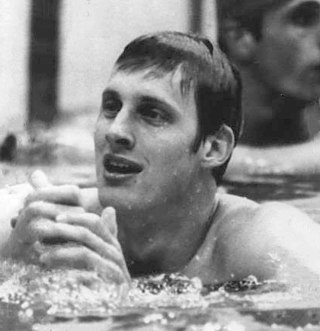
The men's 100 metre freestyle event at the 1976 Summer Olympics took place between July 24 and 25. This was the first time in history that the 100m freestyle was swum under 50 seconds. There were 41 competitors from 27 nations. Nations had been limited to three swimmers each since the 1924 Games. The event was won by Jim Montgomery of the United States, the nation's second consecutive and tenth overall victory in the men's 100 metre freestyle. His countryman Jack Babashoff took silver. Peter Nocke's bronze was the first medal for West Germany in the event, though the United Team of Germany had won a bronze in 1964.

The men's 200 metre freestyle event at the 1976 Summer Olympics took place on July 19 at the Olympic Pool, Montreal. There were 55 competitors from 33 nations, with each nation having up to three swimmers. The medals were swept the United States, the only time there has been a medal sweep in the men's 200 metre freestyle. Bruce Furniss took gold, John Naber silver, and Jim Montgomery bronze. It was the second consecutive and third overall victory by an American swimmer.
The men's 100 metre backstroke was one of six swimming events on the swimming at the 1908 Summer Olympics programme. It was the only backstroke event on the schedule. It was the first appearance of the event, after a 100-yard event was held in 1904. The competition was held on Thursday July 16, 1908 and on Friday July 17, 1908.
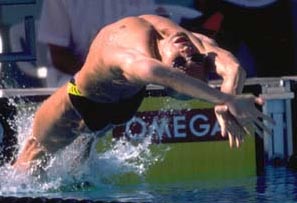
The men's 200 metre backstroke event at the 1992 Summer Olympics took place on 28 July at the Piscines Bernat Picornell in Barcelona, Spain. There were 44 competitors from 34 nations. Each nation had been limited to two swimmers in the event since 1984. The event was won by Martín López-Zubero of Spain. Vladimir Selkov of the Unified Team took silver, while Stefano Battistelli of Italy earned bronze. It was the first medal in the men's 200 metre backstroke for each nation.

The men's 200 metre backstroke event at the 1984 Summer Olympics was held in the Uytengsu Aquatics Center in Los Angeles on July 31, 1984. There were 34 competitors from 25 nations, with each nation limited to two swimmers. The event was won by Rick Carey of the United States, the nation's third victory in the men's 200 metre backstroke. Frédéric Delcourt of France took silver and Cameron Henning of Canada earned bronze; it was the first medal in the event for each of those two nations.
The men's 100 metres event was one of the events in the 1980 Summer Olympics in Moscow. The competition was held on July 24, 1980, and on July 25, 1980. Sixty-five athletes from 40 nations competed. Each nation was limited to 3 athletes per rules in force since the 1930 Olympic Congress. The event was won by Allan Wells of Great Britain, that nation's first title in the men's 100 metres since 1924. Cuba took its first medal in the event since 1964, with Silvio Leonard's silver matching the nation's best result. Petar Petrov's bronze was Bulgaria's first Olympic medal in the men's 100 metres.
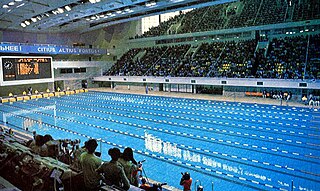
The men's 200 metre backstroke event at the 1980 Summer Olympics was held on 26 July at the Swimming Pool at the Olimpiysky Sports Complex. There were 25 competitors from 16 nations, with each nation having up to three swimmers. The event was won by Sándor Wladár of Hungary, with his countryman Zoltán Verrasztó taking second. Mark Kerry of Australia earned bronze. They were the first medals in the event for both nations. The United States' four-Games podium streak ended due to the American-led boycott.
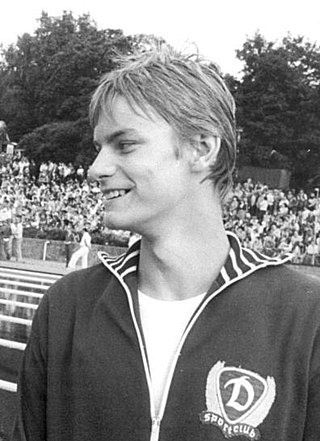
The men's 100 metre freestyle event at the 1980 Summer Olympics was held on 26 and 27 July at the Swimming Pool at the Olimpiysky Sports Complex. There were 39 competitors from 26 nations. Nations had been limited to three swimmers each since the 1924 Games. The event was won by Jörg Woithe of East Germany, the nation's first medal in the men's 100 metre freestyle. Sweden earned its first medals in the event since 1952 with Per Holmertz's silver and Per Johansson's bronze.
The men's 100 metre backstroke was a swimming event held as part of the swimming at the 1924 Summer Olympics programme. It was the fourth appearance of the event, which was established in 1908. The competition was held on Wednesday July 16, 1924, on Thursday July 17, 1924, and on Friday July 18, 1924.
The men's 100 metre backstroke was a swimming event held as part of the swimming at the 1928 Summer Olympics programme. It was the fifth appearance of the event, which was established in 1908. The competition was held from Tuesday to Thursday, 7 to 9 August 1928.
The men's 100 metre backstroke was a swimming event held as part of the swimming at the 1936 Summer Olympics programme. It was the seventh appearance of the event, which was established in 1908. The competition was held from Wednesday to Friday, 12 to 14 August 1936.
The men's 100 metre backstroke event at the 1948 Olympic Games took place between 4 and 6 August, at the Empire Pool. This swimming event used the backstroke. Because an Olympic-size swimming pool is 50 metres long, this race consisted of two lengths of the pool.

The men's 100 metre freestyle event at the 1952 Summer Olympics took place between 26 and 27 July at the Helsinki Swimming Stadium. There were 61 competitors from 33 nations. Nations had been limited to three swimmers each since the 1924 Games. The event was won by Clarke Scholes of the United States, the nation's second consecutive and seventh overall victory in the men's 100 metre freestyle. Japan, absent from the 1948 Games after World War II, returned to the podium in the event with Hiroshi Suzuki's silver. Göran Larsson earned Sweden's first medal in the event since 1908 with his bronze.
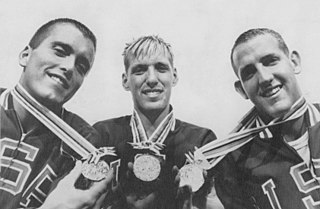
The men's 200 metre backstroke event at the 1964 Summer Olympics took place between October 11 and 13. There were 34 competitors from 21 nations, with each nation having up to 3 swimmers. The medals were swept by the United States, with Jed Graef, Gary Dilley, and Bob Bennett taking gold, silver, and bronze respectively.
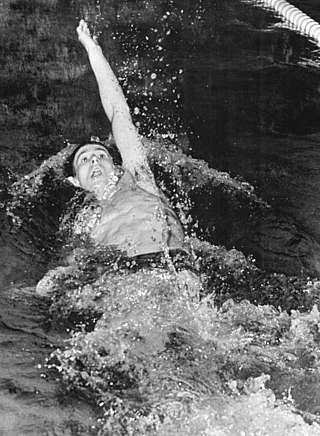
The men's 200 metre backstroke event at the 1968 Summer Olympics took place on 25 October at the Alberca Olímpica Francisco Márquez. There were 30 competitors from 21 nations, with each nation having up to three swimmers. The event was won by Roland Matthes of East Germany, the second gold medal for a German swimmer after Ernst Hoppenberg won in 1900. Matthes completed the backstroke double in the first Games both events were held, with Olympic record times in both. The United States, which had swept the podium in 1964, finished in the next three places behind Matthes: Mitch Ivey took silver, Jack Horsley bronze, and Gary Hall Sr. 4th.
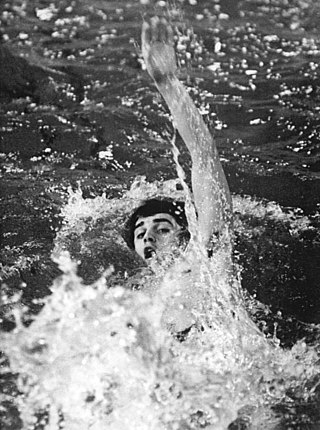
The men's 200 metre backstroke event at the 1972 Summer Olympics took place on September 2 at the Olympia Schwimmhalle. There were 36 competitors from 23 nations, with each nation having up to 3 swimmers. The podium was very similar to the previous Games in 1968, with Roland Matthes of East Germany winning gold and the United States taking the other two medals, including one going to Mitch Ivey. Matthes and Ivey were the first two men to earn multiple medals in the event, with Matthes the first to win back-to-back championships and Ivey adding his 1972 bronze to his 1968 silver. Mike Stamm was the silver medalist in Munich. Matthes also defended his 1968 100 metre backstroke title, giving him the backstroke double a second time.
The men's 100 metres sprint event at the 1976 Olympic Games in Montreal, Quebec, Canada, was held at Olympic Stadium on July 23 and 24. Sixty-three athletes from 40 nations competed. Each nation was limited to 3 athletes per rules in force since the 1930 Olympic Congress. The event was won by Hasely Crawford of Trinidad and Tobago, earning the nation's first gold medal and making Crawford a national hero. Don Quarrie's silver medal made Jamaica only the third country to reach the men's 100 metres podium three consecutive times. Valeriy Borzov of the Soviet Union was unable to defend his title, but by taking bronze became the third man to medal twice in the event. For only the second time, the United States did not have a medalist in the event.












